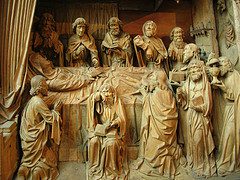Conducting Funerals
While the death of a loved one causes grief and loss for us, the living, it is also the beginning of deeper communication and spiritual growth as we thank God, “who gave us the victory through our Lord, Jesus Christ” 1 Corinthians 15:57
As people of faith, we know that Christ’s Easter Victory has overcome death. Still, we are aware that many challenges and difficulties exist as we face the loss of a loved one. During this time, the people of Grace Episcopal Church will help you during this unhappy and stressful time and assist you to plan and organize a memorial service that reflects the joy of our hope of the life of the world to come, as well as the memory of your loved one’s life. No one needs to face this time alone. We are here to help you.

Parishioners are encouraged to plan their funeral arrangements and service. The parish office has information that can guide you through the process of choosing the service and readings as well as other details. Your documents can be kept on file at Grace Episcopal Church. Please contact us for more information.
The death of a member of the Church needs to be communicated immediately to the Church. The funeral rites are conducted, when possible, in the church. The casket, if any, is closed before the service. The casket remains closed with a pall or other suitable covering to symbolize the equality of all before God. We insist on a closed casket because our purpose is to bury the mortal remains (or cremated remains), not the person, in the grave and the dust from which we all come. The pall is to be placed over the casket and removed from the casket by a member of the Altar Guild.
A Priest normally presides at the service. Readings from the Old Testament and the Epistles are read by a member of the congregation and, if desired, Holy Eucharist is celebrated. After Eucharist and Commendation of the Body (or cremated remains) to God, the remains are committed to the grave. The church and graveside services may be separated by some time, as occasionally people choose a traditional funeral but then cremate the body.
Our funeral rites are, in fact, an Easter liturgy. While we grieve, we celebrate the resurrection Jesus bought for us in His Passion.
Easter hymns are often chosen for music and the white of our hangings reflects the joy of “the resurrection of the dead and the life in the world to come.”(The Apostles Creed, Nicene Creed). The coffin, flowers and tombstone should be simple. Donations to a suggested charity are preferred to flowers.
Grace Memorial Garden
Grace Memorial Garden has been provided as a place for the burial of ashes of parishioners and their families. Through the centuries of Christian history in England, Europe and the United States, the churchyard has been a traditional place for the burial of the dead. Only recently has Western society set aside separate areas for burial grounds, isolated and distant from the churches where the faithful worship. The memorial garden is intended as a place of tranquility and natural beauty, set in the midst of parish life.
No markers are used and ashes are placed beneath the lawn area in biodegradable bags. A scale map in the church office indicates the location of individual ashes, which are recorded in the permanent burial records of the church. A bronze memorial plaque hangs in the parish hall to commemorate those buried in the garden.
Arrangements for interment of ashes in the Memorial Garden are made in consultation with the rector, at which time the actual site selection is made. There is no cost for interring ashes in the garden, although donations are always accepted to cover the cost of the biodegradable bag, engraving a nameplate for the memorial plaque in the parish hall, and helping to maintain the care of the garden with replacement plantings as necessary. Flowers may be placed on the grave at any time. When their time has passed they will be removed. Interment services in the garden will usually follow The Book of Common Prayer. The Memorial Garden is supervised by the Memorial Garden Committee. This committee is made up of volunteer parishioners, appointed by the rector.
